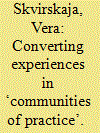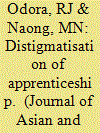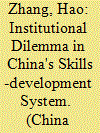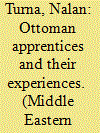| Srl | Item |
| 1 |
ID:
137928


|
|
|
|
|
| Summary/Abstract |
This article looks at ‘educational’ migration instigated by the Danish programme of agricultural apprenticeships, which since the late 1990s has brought many young Ukrainians to rural Denmark. It discusses discrepancies between the logic of achievement implied by the programme’s ideology on the one hand, and Ukrainian apprentices’ aspirations to social mobility on the other hand. In this way, the article questions the concept of ‘community of practice’ that has been used to describe the formation of a social persona sharing the values of this community. Using ethnographic case studies of former apprentices, I argue that while apprenticeships often fail to produce a shared social and professional identity within a community of practice, there are many ways in which the experiences afforded by Danish apprenticeships lead to (sometimes unforeseen) achievements.
|
|
|
|
|
|
|
|
|
|
|
|
|
|
|
|
| 2 |
ID:
133724


|
|
|
|
|
| Publication |
2014.
|
| Summary/Abstract |
The intention of this paper is two-fold; firstly, it is to explore the causal effect of perceived negativity towards Further Education and Training (FET) college education among South African youth. Secondly, it is to determine the impact of apprenticeship on the development of entrepreneurial knowledge and skills among FET college students. The FET sector serves a particular function, which is the imparting of hands-on vocational training, intended to inculcate and promote a culture of self-employment, considered a necessity for employment creation. A questionnaire was used to collect data from 112 randomly selected students from three Motheo FET colleges. The findings reveal very contrasting results, a direct correlation between apprenticeship and entrepreneurship; however, 53% of the respondents did not feel sufficiently equipped, ready and confident enough to start their own businesses after graduation. About 48% feel the need to further their studies at university in order to stand a better chance of landing a good job.
|
|
|
|
|
|
|
|
|
|
|
|
|
|
|
|
| 3 |
ID:
183238


|
|
|
|
|
| Summary/Abstract |
The Chinese government has placed workforce upskilling at the core of its reform agenda to sustain the Chinese “economic miracle.” As such, the Ministry of Human Resources and Social Security (MOHRSS) and Ministry of Education (MOE) have each launched separate apprenticeship reforms geared towards enhancing China's oft-criticized vocational education and training system. Using a self-constructed theoretical framework, this article examines the two reforms and ascribes their divergent outcomes to the two ministries’ distinct approaches to institutionalizing their central initiatives (i.e. the top-down model followed by the MOHRSS versus the collaborative model of the MOE). However, given the absence of industry-level civil society governance in China, neither of these models has delivered ideal training outcomes, although the collaborative model has satisfied more employers and apprentices. China's skills-development reforms have thus become trapped in an institutional dilemma which is likely to impede the long-term economic restructuring efforts of the central state.
|
|
|
|
|
|
|
|
|
|
|
|
|
|
|
|
| 4 |
ID:
166764


|
|
|
|
|
| Summary/Abstract |
In this article, I analyze craft and trade apprentices in the late Ottoman Empire in order to add a new dimension to the existing literature on guilds and artisans. Rather than presenting an ideal picture, I discuss the apprentices' actions and experiences, which I argue did not take place in isolation.
First, I briefly discuss Ottoman guilds and artisans, including a literature review, define and explain both the system of apprenticeship and who apprentices were.
|
|
|
|
|
|
|
|
|
|
|
|
|
|
|
|
| 5 |
ID:
114654


|
|
|
|
|
| Publication |
2012.
|
| Summary/Abstract |
Reviving Ayurveda in post-colonial India has paradoxically been a nationalist venture, where the post-colonial state has restructured traditions, rather than reviving traditional Ayurvedic education, training and apprenticeship. After more than a half century of Indian independence, the majority of Ayurvedic practitioners perceive the impact of British colonial rule negatively, despite the fact that they followed Western methods and frameworks to revive Ayurveda. Today, the training in and research of Ayurvedic education has moved out of the traditional apprenticeship system and into the formal education system. This paper argues that the formalisation and professionalisation of Ayurveda has created an avenue for Ayurvedic graduates to practise backdoor allopathic medicine. Modern-day Ayurvedic practitioners tend to perceive their Ayurvedic training from an allopathic perspective.
|
|
|
|
|
|
|
|
|
|
|
|
|
|
|
|